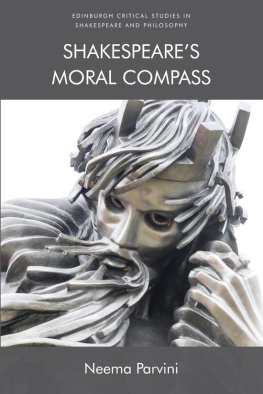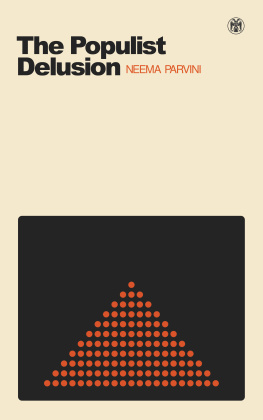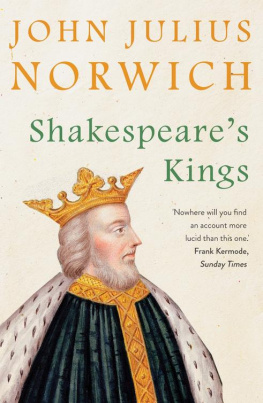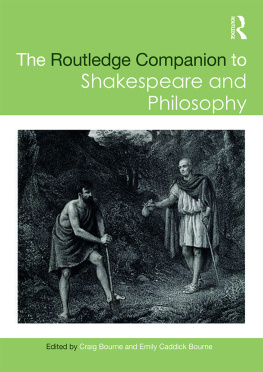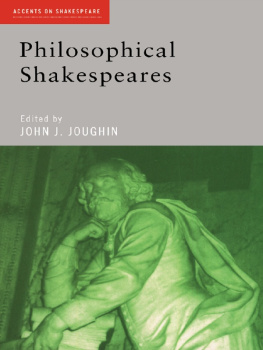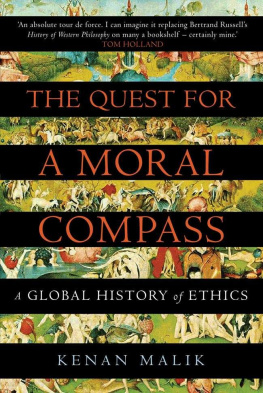
SHAKESPEARES MORAL COMPASS
EDINBURGH CRITICAL STUDIES IN SHAKESPEARE AND PHILOSOPHY
Series Editor: Kevin Curran
Edinburgh Critical Studies in Shakespeare and Philosophy takes seriously the speculative and world-making properties of Shakespeares art. Maintaining a broad view of philosophy that accommodates first-order questions of metaphysics, ethics, politics and aesthetics, the series also expands our understanding of philosophy to include the unique kinds of theoretical work carried out by performance and poetry itself. These scholarly monographs will reinvigorate Shakespeare studies by opening new interdisciplinary conversations among scholars, artists and students.
Editorial Board Members
Ewan Fernie, Shakespeare Institute, University of Birmingham
James Kearney, University of California, Santa Barbara
Julia Reinhard Lupton, University of California, Irvine
Madhavi Menon, Ashoka University
Simon Palfrey, Oxford University
Tiffany Stern, Shakespeare Institute, University of Birmingham
Henry Turner, Rutgers University
Michael Witmore, The Folger Shakespeare Library
Paul Yachnin, McGill University
Published Titles
Rethinking Shakespeares Political Philosophy: From Lear to Leviathan
Alex Schulman
Shakespeare in Hindsight: Counterfactual Thinking and Shakespearean Tragedy
Amir Khan
Second Death: Theatricalities of the Soul in Shakespeares Drama
Donovan Sherman
Shakespeares Fugitive Politics
Thomas P. Anderson
Is Shylock Jewish?: Citing Scripture and the Moral Agency of Shakespeares Jews
Sara Coodin
Chaste Value: Economic Crisis, Female Chastity and the Production of Social Difference on Shakespeares Stage
Katherine Gillen
Shakespearean Melancholy: Philosophy, Form and the Transformation of Comedy
J. F. Bernard
Shakespeares Moral Compass
Neema Parvini
Forthcoming Titles
Making Publics in Shakespeares Playhouse
Paul Yachnin
Derrida Reads Shakespeare
Chiara Alfano
The Play and the Thing: A Phenomenology of Shakespearean Theatre
Matthew Wagner
Shakespeare and the Fall of the Roman Republic: Selfhood, Stoicism and Civil War in Julius Caesar and Antony and Cleopatra
Patrick Gray
Conceiving Desire: Metaphor, Cognition and Eros in Lyly and Shakespeare
Gillian Knoll
Shakespeare and the Truth-Teller: Confronting the Cynic Ideal
David Hershinow
Revenge Tragedy and Classical Philosophy on the Early Modern Stage
Christopher Crosbie
For further information please visit our website at edinburghuniversitypress.com/series/ecsst
SHAKESPEARES
MORAL COMPASS
NEEMA PARVINI
EDINBURGH
University Press
Edinburgh University Press is one of the leading university presses in the UK. We publish academic books and journals in our selected subject areas across the humanities and social sciences, combining cutting-edge scholarship with high editorial and production values to produce academic works of lasting importance. For more information visit our website: edinburghuniversitypress.com
Neema Parvini, 2018
Edinburgh University Press Ltd
The Tun Holyrood Road,
12(2f) Jacksons Entry,
Edinburgh EH8 8PJ
Typeset in 12/15 Adobe Sabon by
IDSUK (DataConnection) Ltd, andd
printed and bound in Great Britain.
A CIP record for this book is available from the British Library
ISBN 978 1 4744 3287 0 (hardback)
ISBN 978 1 4744 3289 4 (webready PDF)
ISBN 978 1 4744 3290 0 (epub)
The right of Neema Parvini to be identified as the author of this work has been asserted in accordance with the Copyright, Designs and Patents Act 1988, and the Copyright and Related Rights Regulations 2003 (SI No. 2498).
CONTENTS
ACKNOWLEDGEMENTS
Id like to thank Kevin Curran for encouraging this project, and Michelle Houston and the rest of the team at Edinburgh University Press for having the vision to launch this excellent and exciting series on Shakespeare and Philosophy. I am also grateful to colleagues who read sections of and made many helpful suggestions on this book, especially Jonathan Haidt, Patrick Gray, Joseph Carroll, Brian Boyd, James Knapp, Evelyn Gajowski, Jyotsna Singh, Will McKenzie, Michael Bristol and Ria Chatterjee. Thank you to Wendy Lee for tremendous copy-editing work, and to Rebecca McKenzie and James Dale for seeing this through to production. Much love also to my parents for their continued support, and especially my mother for her thoughtful comments. Finally, thank you to Sarah Frazer for being such a great partner; your love, patience and understanding, not to mention your attention to detail in proof reading, are much appreciated.
SERIES EDITORS PREFACE
Picture Macbeth alone on stage, staring intently into empty space. Is this a dagger which I see before me? he asks, grasping decisively at the air. On one hand, this is a quintessentially theatrical question. At once an object and a vector, the dagger describes the possibility of knowledge (Is this a dagger) in specifically visual and spatial terms (which I see before me). At the same time, Macbeth is posing a quintessentially philosophical question, one that assumes knowledge to be both conditional and experiential, and that probes the relationship between certainty and perception as well as intention and action. It is from this shared ground of art and inquiry, of theatre and theory, that this series advances its basic premise: Shakespeare is philosophical.
It seems like a simple enough claim. But what does it mean exactly, beyond the parameters of this specific moment in Macbeth? Does it mean that Shakespeare had something we could think of as his own philosophy? Does it mean that he was influenced by particular philosophical schools, texts and thinkers? Does it mean, conversely, that modern philosophers have been influenced by him, that Shakespeares plays and poems have been, and continue to be, resources for philosophical thought and speculation?
The answer is yes all around. These are all useful ways of conceiving a philosophical Shakespeare and all point to lines of enquiry that this series welcomes. But Shakespeare is philosophical in a much more fundamental way as well. Shakespeare is philosophical because the plays and poems actively create new worlds of knowledge and new scenes of ethical encounter. They ask big questions, make bold arguments and develop new vocabularies in order to think what might otherwise be unthinkable. Through both their scenarios and their imagery, the plays and poems engage the qualities of consciousness, the consequences of human action, the phenomenology of motive and attention, the conditions of personhood and the relationship among different orders of reality and experience. This is writing and dramaturgy, moreover, that consistently experiments with a broad range of conceptual crossings, between love and subjectivity, nature and politics, and temporality and form.
Edinburgh Critical Studies in Shakespeare and Philosophy takes seriously these speculative and world-making dimensions of Shakespeares work. The series proceeds from a core conviction that arts capacity to think to formulate, not just reflect, ideas is what makes it urgent and valuable. Art matters because, unlike other human activities, it establishes its own frame of reference, reminding us that all acts of creation biological, political, intellectual and amorous are grounded in imagination. This is a far cry from business-as-usual in Shakespeare studies. Because historicism remains the methodological gold standard of the field, far more energy has been invested in exploring what Shakespeare once meant than in thinking rigorously about what Shakespeare continues to make possible. In response, Edinburgh Critical Studies in Shakespeare and Philosophy pushes back against the critical orthodoxies of historicism and cultural studies to clear a space for scholarship that confronts aspects of literature that can be neither reduced to nor adequately explained by particular historical contexts.
Next page
